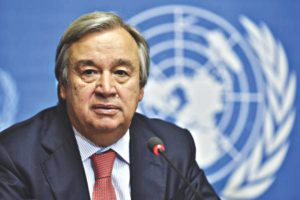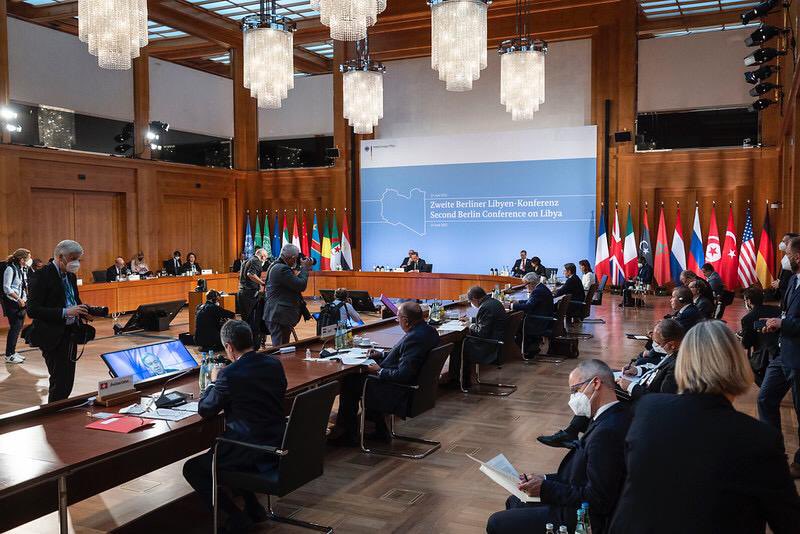By Sami Zaptia.

London, 24 June 2021:
Opening yesterday’s Berlin 2 Conference on Libya, UN Secretary General Antonio Guterres said while much progress has been made since the first Berlin conference in January 2020, full implementation of the Libyan Political Dialogue Road Map needed to be implemented.
This included a full implementation of the October 2020 ceasefire agreement, which entailed withdrawal of all foreign troops and the timely holding of the 24 December elections.
Here is his full speech:
‘‘Excellencies, Ladies and Gentlemen,
I am honoured to open this important meeting, and I thank our hosts, Germany, for their continued commitment to the Berlin process.
Much progress has been made since the first Berlin conference in January 2020.
We are here today to build on that progress, through the full implementation of the Political Roadmap adopted by the Libyan Political Dialogue Forum; the Ceasefire Agreement of October 2020; and the relevant Security Council resolutions, including resolution 2570 concerning the monitoring of the ceasefire, and the holding of presidential and parliamentary elections in December 2021.
Full implementation of the Ceasefire Agreement is of paramount importance to consolidate peace in Libya. I commend the 5+5 Joint Military Commission for working together toward this end, and I am encouraged by the continued investment in confidence-building measures by both sides.
The United Nations is committed to supporting the Libyan Ceasefire Monitoring Mechanism. The initial group of UN ceasefire monitors will be deployed to Tripoli soon.
We must put an end to all foreign interference, including the full withdrawal of all foreign forces and mercenaries from Libya. I urge Libyan and external parties to agree on a comprehensive plan, with clear timelines, to achieve this goal, which UNSMIL stands ready to support.
Excellencies, Ladies and Gentlemen,
Improving security for ordinary Libyans will greatly contribute to further progress on the political track.
Building confidence and trust is key.
I welcome the progress achieved on the political track, in particular the endorsement of the Government of National Unity – including a number of women in key ministerial positions – and the Presidency Council in March this year. I congratulate the Libyan authorities on the peaceful transition of power, a testament to the political will to move forward.
I am also encouraged by the formulation of key priorities aimed at improving living conditions for all Libyans, and I urge the Prime Minister and his cabinet to make good on their pledges.
To help the GNU implement its priorities, which include improving the delivery of basic services including education and healthcare, I call on the House of Representatives to speed up the approval of a unified budget.
A key task of the GNU is the organization of national elections on 24 December 2021.
But achieving this objective requires urgent action. To this end, I urge the House of Representatives to clarify the constitutional basis for elections, and to adopt the necessary legislation.
I also urge the interim executive authority to provide support, including financial resources, to the High National Electoral Commission.
National elections should be a time for unity. All Libyans, including women, youth and internally displaced people, should be able to participate freely in the elections on 24 December, as candidates and voters. Incitement to violence, harassment or hate speech should have no place in the electoral process.
Excellencies, ladies and gentlemen,
Progress on the military and political fronts will need to go hand in hand with serious efforts to address the root causes of instability in Libya. This calls for an inclusive rights-based national reconciliation process, starting at the community level, with a focus on women and young people.
I welcome the decision by the Government of National Unity to establish a High National Reconciliation Commission and reiterate the commitment of the United Nations to work with all partners, particularly the African Union, to support this critical process.
I am very concerned about the serious and deteriorating humanitarian situation in Libya. Some 1.3 million people are estimated to need humanitarian assistance, an increase of 400,000 since last year. I urge Member States to support the Humanitarian Response Plan requesting $189 million to support the most vulnerable, which is just 21 per cent funded.
Consolidating peace and building a prosperous nation needs to be founded on the respect of human rights for all. I am encouraged by the recent establishment of a committee to address the issue of arbitrary detention, particularly for the thousands of pre-trial detainees.
I urge the government to urgently take all necessary measures to protect detainees from violence and ensure accountability for perpetrators of human rights violations.
The arbitrary detention, often under dire conditions, of thousands of migrants and refugees is a tragic phenomenon that needs to end. I continue to call for the immediate release of all refugees and migrants in Libya.
Excellencies, ladies and gentlemen,
The United Nations is fully committed to facilitating the Libyan-led and Libyan-owned processes in support of the ceasefire agreement, national reconciliation and transitional justice, and the holding of elections on 24 December.
I encourage Libyan authorities and institutions to shoulder their responsibilities and move forward together towards stability and unity.
The future of Libya is in their hands.
Thank you’’.







